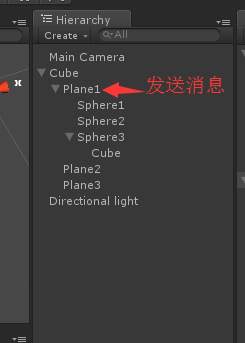[Unity3D] 04 - Event Manager
message消息管理
脚本与GameObject的关系
被显式添加到 Hierarchy 中的 GameObject 会被最先实例化,GameObject 被实例化的顺序是从下往上。
GameObject 被实例化的同时,加载其组件 component 并实例化,
如果挂载了脚本组件,则实例化脚本组件时,将调用脚本的 Awake 方法,组件的实例化顺序是也是从下往上。
在所有显式的 GameObject 及其组件被实例化完成之前,游戏不会开始播放帧。
当 GameObject 实例化工作完成之后,将开始播放游戏帧。每个脚本的第一帧都是调用 Start 方法,其后每一帧调用 Update,而且每个脚本在每一帧中的调用顺序是从下往上。
总结:被挂载到 GameObject 下面的脚本会被实例化成 GameObject 的一个成员。
Unity 3种message消息管理使用
Ref: http://blog.csdn.net/u011484013/article/details/51487936
- BroadcastMessage(<接收函数名>) 广播消息
- SendMessage(<接收函数名>) 发送消息
- SendMessageUpwards(<接收函数名>) 向上发送消息
举个例子:
MonoBehaviour 是 Unity 中所有脚本的基类,
- 如果你使用JS的话,脚本会自动继承MonoBehaviour。
- 如果使用C#的话,你需要显式继承MonoBehaviour。
- 示范:

- 发送消息

using UnityEngine; using System.Collections; public class xx1 : MonoBehaviour { void OnGUI() { if (GUI.Button(new Rect(10, 10, 100, 50), "发送1")) { SendMessage("myTest"); # <-- button 1 向当前对象挂载的所有脚本上面发送消息 } if (GUI.Button(new Rect(10, 150, 100, 50), "发送2")) { BroadcastMessage("myTest"); # <-- button 2 朝物体和所有子物体发送消息 } if (GUI.Button(new Rect(10, 200, 100, 50), "发送3")) { SendMessageUpwards("myTest"); # <-- button 3 朝物体和上级父物体发送信息 } } }
- 接收消息

using UnityEngine; using System.Collections; public class XXX : MonoBehaviour { // Use this for initialization void Start () { } // Update is called once per frame void Update () { } void OnDrag(Vector2 delta) { Debug.Log("-------OnDrag--------"); } public void myTest() { Debug.Log("this is a methord:" + gameObject.name); } }
EventManager的两种简单实现方式
From: http://blog.csdn.net/u010989951/article/details/79051299
第一种、调用Unity的事件系统来进行封装,
另一种、使用C#的事件与委托机制实现。
这里讲解第一种,即采用Unity事件系统API来实现;第二种详见原链接。
- EventManager 定义
using System.Collections; using System.Collections.Generic; using UnityEngine; using UnityEngine.Events; public class EventManager { private Dictionary<string, UnityEvent> eventDictionary=new Dictionary<string, UnityEvent>(); private static EventManager eventManager = new EventManager(); private EventManager() { }
public static EventManager GetInstance { get { return eventManager; } }
public void StartListening(string eventName, UnityAction listener) { UnityEvent thisEvent = null; if (eventManager.eventDictionary.TryGetValue(eventName, out thisEvent)) { thisEvent.AddListener(listener); // 给event [UnityEvent]附上listener } else { thisEvent = new UnityEvent(); thisEvent.AddListener(listener); eventManager.eventDictionary.Add(eventName, thisEvent); } } public void StopListening(string eventName, UnityAction listener) { if (eventManager == null) return; UnityEvent thisEvent = null; if (eventManager.eventDictionary.TryGetValue(eventName, out thisEvent)) { thisEvent.RemoveListener(listener); } } public void TriggerEvent(string eventName) { UnityEvent thisEvent = null; if (eventManager.eventDictionary.TryGetValue(eventName, out thisEvent)) { thisEvent.Invoke(); } } }
- Event 注册
using UnityEngine; using UnityEngine.Events; using System.Collections; using System; public class EventTest : MonoBehaviour { private Event_CallBack someListener; void Awake() { someListener = new Event_CallBack(SomeFunction); } void OnEnable() { EventManager.GetInstance.StartListening("test", someListener); EventManager.GetInstance.StartListening("Spawn", SomeOtherFunction); EventManager.GetInstance.StartListening("Destroy", SomeThirdFunction); } void OnDisable() { EventManager.GetInstance.StopListening("test", someListener); EventManager.GetInstance.StopListening("Spawn", SomeOtherFunction); EventManager.GetInstance.StopListening("Destroy", SomeThirdFunction); } void SomeFunction(object sender) { Debug.Log("Some Function was called!"); } void SomeOtherFunction(object sender) { Debug.Log("Some Other Function was called!"); } void SomeThirdFunction(object sender) { Debug.Log("Some Third Function was called!"); } }
- Event 触发
using UnityEngine; using System.Collections; public class EventTriggerTest : MonoBehaviour { void Update() { if (Input.GetKeyDown("q")) { EventManager.GetInstance.TriggerEvent("test"); } if (Input.GetKeyDown("o")) { EventManager.GetInstance.TriggerEvent("Spawn"); } if (Input.GetKeyDown("p")) { EventManager.GetInstance.TriggerEvent("Destroy"); } if (Input.GetKeyDown("x")) { EventManager.GetInstance.TriggerEvent("Junk"); } } }
- UnityAction和UnityEvent的用法详解
Ref: http://blog.csdn.net/inlet511/article/details/46822907
-
UnityAction本质上是delegate,且有数个泛型版本(参数最多是4个),一个UnityAction可以添加多个函数 (多播委托)。
-
UnityEvent本质上是继承自UnityEventBase的类,它的AddListener()方法能够注册UnityAction,RemoveListener能够取消注册UnityAction,还有Invoke()方法能够一次性调用所有注册了的UnityAction。UnityEvent也有数个泛型版本(参数最多也是4个),但要注意的一点是,UnityAction的所有带参数的泛型版本都是抽象类(abstract),所以如果要使用的话,需要自己声明一个类继承之,然后再实例化该类才可以使用。
不使用带参数的UnityEvent:
using UnityEngine; using System.Collections; using UnityEngine.Events; public class UnityActionAndEvent : MonoBehaviour { public UnityAction action; public UnityEvent myEvent = new UnityEvent(); void Start() { action = new UnityAction(MyFunction); action += MyFunction2; myEvent.AddListener(action); } void Update() { if(Input.GetKeyDown(KeyCode.P)) { myEvent.Invoke(); } } public void MyFunction() { print ("Hello: "); } public void MyFunction2() { print ("Hello2: "); } }
使用带参数的UnityEvent:
using UnityEngine; using System.Collections; using UnityEngine.Events; //因为UnityEvent<T0>是抽象类,所以需要声明一个类来继承它 public class MyEvent:UnityEvent<int>{} public class UnityActionWithParameter : MonoBehaviour { public MyEvent myEvent = new MyEvent(); public UnityAction<int> action; void Start () { action = new UnityAction<int>(MyFunction); action += MyFunction2; myEvent.AddListener(action); } void Update () { if(Input.GetKeyDown(KeyCode.A)) { myEvent.Invoke(10); } } public void MyFunction(int i) { print (i); } public void MyFunction2(int i) { print(i*2); } }
Unity中通过面板中添加的Listener和通过脚本添加的Listener实际上是两种不同类型的Listener:
- 在脚本中通过AddListener()添加的是一个0个参数的delegate(UnityAction)回调。是不可序列化的,在Inspector中是无法看到的。这种Listener是常规Listener。
- 在Inspector中添加的则是永久性的Listener(persistent listener)。他们需要指定GameObject、方法以及方法需要的参数。他们是序列化的,用脚本是无法访问到的。
添加任意多个参数的函数
另外在脚本中使用lamda表达式来添加listener是非常方便的。
using UnityEngine; using System.Collections; using UnityEngine.EventSystems; using UnityEngine.UI; public class EventAndLamda : MonoBehaviour { void Start () { //lamda方式可以添加包含任意参数的函数,非常方便 GetComponent<Button>().onClick.AddListener( ()=>{
//此处其实可以直接写Myfuction(.....),因为是同一个脚本里的函数 //这样写是为了说明调用其他组件中的函数也是可以的。如果有其他组件的引用,可以直接写: //someReference.theMethod(arguments);
this.GetComponent<EventAndLamda>().MyFunction(10,20.0f,new Vector3(1,1,1)); } ); } public void MyFunction(int i, float f, Vector3 v) { print (i.ToString()+"\n" + f.ToString() + "\n" + v.ToString()); } }
Package: UnityEditor.Events
Class: UnityEventTools
Description: Editor tools for working with persistent UnityEvents.
| AddBoolPersistentListener | Adds a persistent, preset call to the listener. |
| AddFloatPersistentListener | Adds a persistent, preset call to the listener. |
| AddIntPersistentListener | Adds a persistent, preset call to the listener. |
| AddObjectPersistentListener | Adds a persistent, preset call to the listener. |
| AddPersistentListener | Adds a persistent, call to the listener. Will be invoked with the arguments as defined by the Event and sent from the call location. |
| AddStringPersistentListener | Adds a persistent, preset call to the listener. |
| AddVoidPersistentListener | Adds a persistent, preset call to the listener. |
| RegisterBoolPersistentListener | Modifies the event at the given index. |
| RegisterFloatPersistentListener | Modifies the event at the given index. |
| RegisterIntPersistentListener | Modifies the event at the given index. |
| RegisterObjectPersistentListener | Modifies the event at the given index. |
| RegisterPersistentListener | Modifies the event at the given index. |
| RegisterStringPersistentListener | Modifies the event at the given index. |
| RegisterVoidPersistentListener | Modifies the event at the given index. |
| RemovePersistentListener | Removes the given function from the event. |
| UnregisterPersistentListener | Unregisters the given listener at the specified index. |




